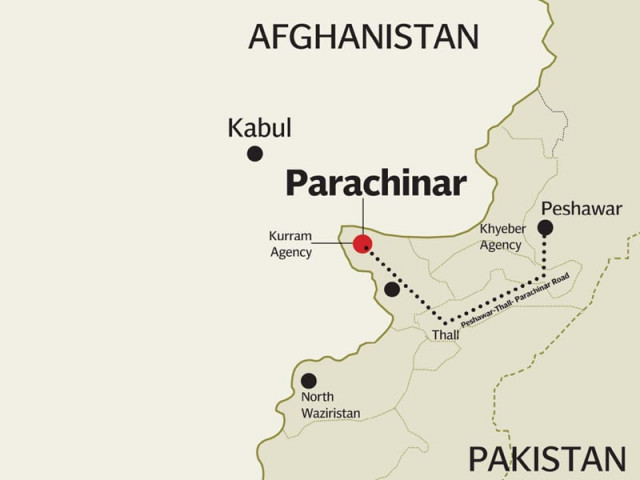Kurram Agency peace deal: Tribal elders to enforce pact in Parachinar only
The accord doesn’t envisage the reopening of Thall-Parachinar highway.

Kurram Agency peace deal: Tribal elders to enforce pact in Parachinar only
Tribal elders in the Kurram Agency have agreed to enforce a pact signed by rival sects in Murree almost three years ago but left unimplemented since then, senior delegates said on Monday.
The deal — hammered out by 25 representatives each of the two sects during a tribal assembly (jirga) in Parachinar on Sunday with Political Agent Shahuddin Shahab as the guarantor – calls for implementing in letter and spirit an agreement signed by a grand jirga of Sunni and Shia tribal elders in Murree in 2008.
The agreement is Parachinar-centric and has nothing to do with the reopening of the Thall-Parachinar road closed to traffic since 2007 (as reported in a section of the press), tribal elders told The Express Tribune on Monday.
“The 9-point agreement is for Parachinar city only – it’s not applicable to the rest of the region,” Ataullah Khan, the top Sunni negotiator at the jirga, told The Express Tribune by telephone from Kohat. “However, tribesmen from elsewhere in the agency will have to abide by the agreement when they enter Parachinar,” Khan added.
The Shia elders also endorsed Khan’s claim. “Yes, the reopening of the Thall-Parachinar road was not discussed at the jirga,” Khadim Hussain, the spokesperson for Anjuman-e-Hussainia told The Express Tribune by phone. “We’re following a step-by-step approach, the reopening of the highway will be discussed in the next stage,” he added.
At Sunday’s jirga Malik Hamid Hussain, secretary of Anjuman-e-Hussainia, and Professor Jameel Qazi, led the Shia delegation.
According to Sunday’s agreement, hundreds of Sunni families displaced by fighting would be repatriated to their homes in Parachinar. And the two sides will constitute a committee to settle other petty issues.
Display of arms in Parachinar city has been banned and a fine of Rs1 million will be imposed on violators. Nobody would try to avenge any earlier murder. The authorities would take action against the violators who would also pay a fine of Rs2 million to the community.
The two communities will ensure sanctity of mosques and imambargahs and would not make derogatory remarks against the beliefs of each other. The agreement also makes it binding on both groups to deny shelter to troublemakers, identify such elements and help the government in taking action against them.
Both sides will endorse if the government decides to take action against the troublemakers in the agency. “This is an important point because it paves way for future military actions in the region,” Khan said.
Ataullah Khan said that they had proposed smaller city-level jirgas be held to end years of bloodshed in the region. “It’s good that the authorities have finally accepted our demand,” he said, adding that the Parachinar was the second agreement this month. “On Saturday, Shia and Sunni tribes also signed an agreement to end 30 years of rivalry,” he added.
Although Khan was very happy with their modest success, tribal experts are not pinning much hope on such isolated agreements.
“It’s encouraging that Malik Waris Khan Afridi – who has been active in peace talks since 2007 – was part of Sunday’s deal. But any deal which doesn’t have the support of local Taliban militants has little chance of success,” Peshawar-based analyst Khadim Hussain told The Express Tribune by phone.
Malik Haji Ghulab Hussain Turi, a Shia member of the grand tribal jirga, also agreed with Hussain. “Without the support of the local warlords, durable peace cannot be restored in the region,” he told The Express Tribune, referring to Fazal Saeed Haqqani, the top commander of the Tehreek-e-Taliban Pakistan, who recently broke off the TTP to form his own Tehreek-e-Taliban Islami.
Haji Ghulab also said that peace between the rival factions was not possible without the reopening of the Thall-Parachinar road. “How can we have peace while the highway is still closed for traffic?” he asked. However, he added that they have discussed the issue with Khyber-Pakhtunkhwa Governor Masood Kauser, who rules the tribal regions in the name of president of Pakistan.
“We have demanded that the government set up security pickets along the road and that these pickets should be manned by both Shia and Sunni security personnel,” he added.
Published in The Express Tribune, October 11th, 2011.



















COMMENTS
Comments are moderated and generally will be posted if they are on-topic and not abusive.
For more information, please see our Comments FAQ